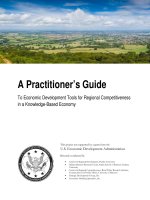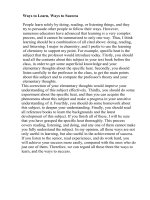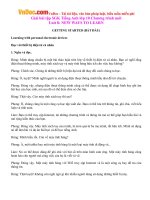TIENGANH10-UNIT8-NEW WAYS TO LEARN
Bạn đang xem bản rút gọn của tài liệu. Xem và tải ngay bản đầy đủ của tài liệu tại đây (169.46 KB, 9 trang )
<span class='text_page_counter'>(1)</span><div class='page_container' data-page=1>
<b>UNIT 8: NEW WAYS TO LEARN</b>
<b>LESSON 1: VOCABULARY+ READING</b>
<b>Vocabulary:</b>
<b>Word</b> <b>Type</b> <b>Pronunciation</b> <b>Meaning</b>
access <i>(v):</i> /ˈækses/ truy cập
application <i>(n):</i> /ˌæplɪˈkeɪʃn/ ứng dụng
concentrate <i>(v):</i> /ˈkɒnsntreɪt/ tập trung
device <i>(n):</i> /dɪˈvaɪs/ thiết bị
digital <i>(adj):</i> /ˈdɪdʒɪtl/ kỹ thuật số
disadvantage <i>(n):</i> /ˌdɪsədˈvɑːntɪdʒ/ nhược/ khuyết điểm
educate <i>(v):</i> /ˈedʒukeɪt/ giáo dục
+ education <i>(n):</i> /ˌedʒuˈkeɪʃn/ nền giáo dục
+ educational <i>(adj):</i> /ˌedʒuˈkeɪʃənl/ có tính/ thuộc giáo dục
fingertip <i>(n):</i> /ˈfɪŋɡətɪp/ đầu ngón tay
identify <i>(v):</i> /aɪˈdentɪfaɪ/ nhận dạng
improve <i>(v):</i> /ɪmˈpruːv/ cải thiện, cải tiến
instruction <i>(n):</i> /ɪnˈstrʌkʃn/ hướng dẫn, chỉ dẫn
native <i>(adj):</i> /ˈneɪtɪv/ (thuộc) bản ngữ
portable <i>(adj):</i> /ˈpɔːtəbl/ xách tay, có thể mang theo
software <i>(n):</i> /ˈsɒftweə(r)/ phần mềm
syllable <i>(n):</i> /ˈsɪləbl/ âm tiết
technology <i>(n):</i> /tekˈnɒlədʒi/ công nghệ
touch screen <i>(n.phr):</i> /tʌtʃ skriːn/ màn hình cảm ứng
voice recognition <i>(n.phr):</i> /vɔɪsˌrekəɡˈnɪʃn/ nhận dạng giọng nói
<b>I. Supply the correct word form.</b>
1. Learning vocabulary by heart may be an __________ way to learn English because you can’t improve your
pronunciation and accent by doing so. (effect)
2. He’s very good at _________ skills, so he easily convinces people to follow him. (communicate)
3. Letting students use their own digital devices in class can improve the __________ experience in many
ways. (education)
4. Teachers are always looking at new ways to develop and _____ their teaching. (improvement)
5. Many devices offer apps which use voice __________ technology. (recognize)
6. Personal ____ devices are useful for learning. (electric)
7. I think people use smartphones mostly for _______. (communicate)
8. If your smartphone rings in class, it will be very annoying and __________. (disruption)
<b>II. Fill in each blank with one suitable word from the box</b>
9. My son, who is a promising pianist, is now interested in composing _______ music.
10. Please don't ask him questions about his family. He hates answering _______questions.
11. The phrase ‘____ natives’ refers to people who are familiar with computers and the Internet from an
early age.
12. I'm looking for some new ________ to put on my smartphone to improve my English pronunciation.
13. That laptop, which has the latest ______, is very expensive.
14. People are now familiar with the term m - learning o r _____ learning, which focuses on the use of
personal electronic devices.
<b>III. Choose the best option for each of the following sentences.</b>
15. They’re excellent learning ____. You can store information, take notes, write essays and do calculations.
A. applications B. tools C. gadgets D. techniques
16. I would prefer to go to university and do a ____ in International Studies, rather than start work.
A. certificate B. result C. degree D. qualification
</div>
<span class='text_page_counter'>(2)</span><div class='page_container' data-page=2>
17. My dad wants me to go university, but I’m in ____ minds about it.
A. my B. two C. some D. different
18. Most computers have enough ____ to store a vast amount of information.
A. database B. document C. memory D. word processor
<i><b>Choose the word(s) CLOSEST in meaning to the underlined word(s) in each of the following questions</b></i>
19. Permanent damage to children's body may be caused by frequent contact with electronic devices.
A. Immediate B. Long-lasting C. Short-term D. Serious
20. For very young children, electronic devices may help promote listening and speaking skills.
A. advertise B. popularize C. discourage D. improve
<i><b>Choose the word(s) OPPOSITE in meaning to the underlined word(s) in each of the following questions.</b></i>
21. In my country, it is compulsory to go to school between the ages of five and sixteen.
A. necessary B. essential C. optional D. selective
22. Electronic dictionaries are now common in English classes. They can be very easily downloaded into your
personal electronic devices.
A. individual B. public C. private D. possessive
<b>IV. READING</b>
<i><b>A. Read the following passage and mark the letter A, B, C, or D to indicate the correct word that best fits</b></i>
<i><b>each of the numbered blanks.</b></i>
Children in the Netherlands must be at least four years old to (23) _____ primary education. Almost all
4-year-olds (99.3%) in the country indeed attend primary school, (24) _____ this is not compulsory until children
reach the age of 5. Primary school is free of charge. In most schools, children are grouped by age in mixed
ability classes, with one teacher for all subjects. Primary school (25) _____ of 8 groups, thus schooling lasts for
8 years. During the first two years, which (26) _____ kindergarten, children receive an average of 22 hours of
(27) _____, during the last 6 years children receive an average of 25 hours per week. Schools are open 5 days a
week, but children are free on Wednesday afternoon. At the end of primary school, or in group 8, schools
advice on secondary school choice. Most schools use a national test to support this advice, for instance the
“Citotoets”, a test developed by the Central Institute for Test.
23. A. afford B. enter C. come D. run
24. A. although B. despite C. however D. due to
25. A. includes B. contains C. consists D. composes
26. A. also called B. is also called C. is called also D. is also calling
27. A. develop B. to develop C. developing D. development
<i><b>B. Read the following passage and mark the letter A, B, C, or D to indicate the correct answer to each of the</b></i>
<i><b>questions.</b></i>
A smart board is an interactive whiteboard. It can be connected to one or more laptops, PCs, tablets, or
other electronic devices. Smart boards are extremely useful in a classroom because they can engage students,
provide interactive opportunities that a traditional whiteboard, blackboard or flip chart can't, and can also
develop students' computer skills along with their English skills.
Smart boards also have touch-screen technology so you do not actually need a computer to access the basic
functionality. You can write on a smart board with special pens which are usually provided with the board, and
anything written on the board can be saved for future reference, or printed out. It is great, for example, if you
are doing a brainstorming session or a mind map with your classmates and you want to keep a record of it.
If you don't want to draw with the pens, you can use a keyboard and type onto a programme such as Word,
and have it appear on the screen for everyone to see. This is great if you are doing an exercise with your class
and you want everyone to be able to see the answers during the checking stage. You can also run PowerPoint
presentations on an interactive whiteboard. These can sometimes be great for grammar or vocabulary
presentations and the advantage of them is that students can make contributions.
If you have the Internet access, you can access websites and put them onto a white board. This is great in an
English classroom if you have online quizzes or games you want to use. Students can actually come up to the
board and select their answers. This involves them directly in the board work, which they usually love. You can
also run video clips or sound files from the Internet, or some which are saved on your computer.
In short, a smart board can make the lessons more varied, and can give students a more active role in the
lesson.
28. A smart board is more useful than a traditional board because .
A. it can be connected to more electronic devices
B. it can be used instead of a whiteboard, blackboard or flip chart
C. it provides more interactive opportunities
</div>
<span class='text_page_counter'>(3)</span><div class='page_container' data-page=3>
29. Smart boards which have touch-screen technology is great because .
A. you can write on it, save information, or print it later
B. you can do a brainstorming session or a mind map with your classmates
C. you do not need anything to write on it
D. you can use a keyboard and type onto a program such as Word
30. It is great for you to run Word or PowerPoint on a smart board because .
A. you don’t need to draw with the pens
B. you can see the answers before the checking stage
C. it can be used for grammar or vocabulary presentations
D. everyone can see your presentations and take part in them
31. With the Internet access, the smart board is a wonderful tool for education because .
A. students can use write on a smart board with special pens
B. we can have multimedia lessons and more contributions from students
C. students can download video clips or sound files from the Internet
D. we can use anything that is saved on our computer
32. All of the following are true about a smart board EXCEPT .
A. the lessons are more diverse and students are more active
B. you do not actually need a computer to access the basic functionality
C. it develops students’ English skills but not computer ones
</div>
<span class='text_page_counter'>(4)</span><div class='page_container' data-page=4>
<b>UNIT 8: NEW WAYS TO LEARN</b>
<b>LESSON 2: LEXICO - GRAMMAR </b>
<b>A.GRAMMAR REVIEW</b>
<i><b>I.</b></i> <b>RELATIVE PRONOUNS</b>
<i><b>1.</b></i><b>Who: dùng để thay thế cho danh từ chỉ người, làm chủ ngữ trong mệnh đề quan hệ, sau Who là "be/V".</b>
`Ex: The man is Mr. Pike. He is standing over there.
=> The man who is standing over there is Mr. Pike.
<i><b>2.</b></i> <b>Whom: dùng để thay thế cho danh từ chỉ người, làm tân ngữ trong mệnh đề quan hệ, sau Whom là "a </b>
<i>clause".</i>
Ex: That is the girl. I told you about her.
=> That is the girl whom I told you about.
<b>Note: Whom làm tân ngữ có thể được bỏ đi trong mệnh đề quan hệ xác định.</b>
<i><b>3.</b></i><b>Which: which dùng để thay thế cho danh từ chỉ vật, làm chủ ngữ hoặc tân ngữ trong mệnh đề quan </b>
<i>hệ. Ex: The dress is very beautiful. I bought it yesterday.</i>
=> The dress which I bought yesterday is very beautiful.
<b>Note: Which làm tân ngữ có thể được bỏ đi trong mệnh đề quan hệ xác định.</b>
<i><b>4.</b></i><b>That: là đại từ chỉ cả người và vật, đứng sau danh từ để làm chủ ngữ hoặc tân ngữ trong mệnh đề quan</b>
<i>hệ.</i>
Ex: This is the book. I like it best.
=> This is the book that I like best.
<b>Note: + Sau dấu phẩy không bao giờ dùng that</b>
<i>That luôn được dùng sau các danh từ hỗn hợp (gồm cả người lẫn vật) everything, something, anything, all </i>
<i><b>little, much, none và sau dạng so sánh nhất.</b></i>
<i><b>5.</b></i><b>Whose: là đại từ quan hệ chỉ sở hữu. Whose đứng trước danh từ chỉ người hoặc vật và thay thế cho tính </b>
từ sở hữu hoặc sở hữu cách trước danh từ. Sau whose là 1 danh từ.
Ex: John found a cat. Its leg was broken.
=> John found a cat whose leg was broken.
<i><b>II.</b></i> <b>RELATIVE ADVERBS</b>
<i><b>1.</b></i> <b>When: dùng để thay thế cho danh từ chỉ thời gian, </b><i><b>When </b>được thay cho <b>at/on/in </b>+ danh từ thời gian</i>
<i>hoặc then.</i>
Ex: May Day is a day. People hold a meeting on that day.
=> May Day is a day when people hold a meeting.
<i><b>2.</b></i> <b>Where: </b><i>dùng để thay thế cho danh từ chỉ nơi chốn, When được thay cho <b>at/on/in + danh từ nơi chốn</b></i>
<i>hoặc there.</i>
Ex: Do you know the country? I was born.
=> Do you know the country where I was born?
<i><b>3.</b></i><b>Why: dùng để thay thế cho danh từ chỉ lí do. Why thay cho for </b>
<i><b>which. Ex: I don't know the reason. She left him alone.</b></i>
=> I don't know the reason why she left him alone.
<b>B. EXERCISES:</b>
<b>I. Choose the word whose underlined part is pronounced differently from that of the rest in the following</b>
<b>questions.</b>
1. A. challenge B. characteristic C. exchange D. charity
2. A. programme B. electronic C. project D. knowledge
3. A. tablet B. access C. application D. landscape
4. A. literature B. creature C. portable D. picture
<b>II. Choose the word that differs from the other three in the position of primary stress in the following</b>
<b>questions.</b>
5. A. successful B. cognitive C. different D. wonderful
6. A. efficient B. exciting C. distracting D. portable
7. A. convenient B. permanent C. attractive D. important
8. A. modernize B. organize C. indicate D. continue
</div>
<span class='text_page_counter'>(5)</span><div class='page_container' data-page=5>
9. Smartphones, laptops, and tablets are the modern devices _____ have changed the way we think.
10. Isn’t that Tim, the boy _____ father owns a red car?
11. Students _____ get below-average exam results do not have the best prospects.
12. I don’t understand the assignment _____ the professor gave us for next Monday.
13. This is the book in _____ Foster describes his experience of the war.
14. I live in a dormitory _____ residents come from many countries.
15. Tina gave her ticket to the concert to John, _____ then sold it to Nick.
<b>IV. WRITING: Combine each pair of sentences into one, using “which”, “that”, “who”, “whose”. Use</b>
<b>comma(s) if necessary.</b>
16. Can you see the girl? Her father is the owner of the smartphone store.
……….………..
17. Lan can communicate with foreigners very well. She’s very good at English.
……….………..
18. My laptop is very useful. I can’t find information for my assignment without it.
……….………..
19. I use this tablet to download essential materials every day. It was bought by my father.
……….………..
20. She doesn’t need to go to the library to borrow those books. They are free on the Internet.
……….………..
21. My English audio files are stored in my smartphone. They help me to improve my listening skills.
……….………..
22. My teacher is very strict. She doesn’t encourage us to use e-dictionaries.
……….………..
23. With a laptop connected to the Internet, I can look up unknown words. They are unexplained sufficiently in
the paper dictionary.
……….………
<b>V. MULTIPLE CHOICE. Choose the best answer.</b>
24. “Who's that over there?" - "Oh, it's our new teacher, ____ just started work today."
A. that B. who he C. which he D. who
25. "Which CD did you get Marcus in the end?" – "I got him the one ____ said he really wanted to hear."
A. that B. who he C. whose D. which he
26. “Who did you send a Valentine's card to?" - "I'm not telling you, but it was someone ____ name begins with
“B”.”
A. which B. who her C. whose D. whose her
27. "Why don't we go to Lionel's for dinner tonight?” - “Is that the new restaurant ____ has just opened on the
other side of town?"
A. which B. where C. that it D. which it
28. What do you want to do this summer?” – “I think we should go somewhere ____ has plenty of sun and
sand."
A. who B. where C. when D. that
29. Smartphones, laptops and tablets are the modern devices ____ have changed the way we think.
A. what B. Ø C. whose D. that
30. Students use smartphones to record their phone calls, ____ they later share with the class.
A. Ø B. that C. which D. whose
31. A tablet is perfect for people ____ work is to draw and write.
A. who B. Ø C. which D. whose
32. You can access the Internet, download programs and information ____ can help you understand the material
and widen your knowledge.
A. what B. that C. Ø D. who
33. My teacher, ____ has been teaching for 25 years, finds it hard to make use of electronic devices in her
teaching.
A. she B. who she C. who D. whose
34. That media player, ____ I often use to practise my English, has some great apps.
A. Ø B. that C. what D. which
35. Isn't that Tim, the boy ____ father owns a huge yacht?
</div>
<span class='text_page_counter'>(6)</span><div class='page_container' data-page=6>
<b>Identify the one underlined word or phrase that must be changed to make the sentence correct.</b>
36. The man whom remained in the office was the manager.
A B C D
37. This novel, which written by a well-known writer, should be read.
A B C D
38. My friend George, that arrived late, was not permitted to enter the class.
A B C D
39. This is the only place which we can obtain scientific information.
A B C D
40. A tablet is a mobile computer is also useful for language learning.
</div>
<span class='text_page_counter'>(7)</span><div class='page_container' data-page=7>
<b>UNIT 8: NEW WAYS TO LEARN</b>
<b>LESSON 3: PRACTICE TEST</b>
<i><b>Choose the word whose underlined part is pronounced differently from that of the rest in the following</b></i>
<i><b>questions.</b></i>
1. A. software B. aware C. cigarette D. careful
2. A. portable B. organic C. import D. opportunity
<i><b>Choose the word that differs from the other three in the position of primary stress in the following questions.</b></i>
3. A. instruction B. instagram C. installment D. insurance
4. A. recognize B. realize C. reconnect D. reference
<i><b>Choose the best option.</b></i>
5. Most computers have enough ____ to store a vast amount of information.
A. database B. document C. memory D. word processor
6. You can’t get into the Internet unless your computer has a(an) ____.
A. access B. terminal C. web page D. modem
7. Many people only use their computer as a ____. All they do is to write letters and reports on it.
A. word processor B. template C. document D. spreadsheet
8. The World Wide Web is made up of millions of ____ created by anybody from multi-media corporations to
ordinary people like you and me.
A. newsgroups B. chatrooms C. users D. sites
9. On the web you can read ____ newspapers or magazines; you can watch videos, download music or buy
anything.
A. virtual B. online C. digital D. offline
10. I went to classes two evenings a week and I was surprised at how quickly I ____ progress.
A. had B. made C. did D. produced
11. If you're not sure what something means, __ in your dictionary or use your electronic dictionary for help.
A. check up B. look up C. translate D. interpret
12. Whenever you hear a new word that you think is important, ____ in your notebook.
A. keep it down B. put it down C. write it down D. spell it down
13. She had to ____ her First Certificate Exam three times.
A. study B. take C. make D. do
14. Like children elsewhere, children in the US have greatly benefited ____ modern technology.
A. of B. from C. in D. with
15. "May I use your tablet for a while, pleaser" – “____”
A. No way, It cost a fortune! B. I'm so sorry, I'm using it myself.
C. Stay away from it! D. No, it's busy now.
16. .“ ____" - "I hate it, but I have to do it.”
A. How do you feel about learning English? B. How do you learn English?
C. Is English important in your country? D. Is English easy to learn?
17. “Hi, Sarah. What are you studying?" - "English, We have a test tomorrow” – “____”
"Thank you. I'm going to need it!"
A. Oh, really? B. Oh, good luck! C. Oh, lucky you. D. Oh, luckily.
18. Mr Forbes teaches a class for students ____ native language is not English.
A. which B. who C. whose D. those who
19. I have just found the book ____.
A. you were looking for B. which you were looking
C. for that you were looking D. you were looking
20. I don't understand the assignment ____ the professor gave us last Monday.
A. which B. that C. Ø D. All are correct
21. Students ____ get below-average exam results do not have the best prospects.
A. whose B. who C. Ø D. All are correct
22. I live in a dormitory ____ residents come from many countries.
A. where B. which C. in where D. whose
</div>
<span class='text_page_counter'>(8)</span><div class='page_container' data-page=8>
C. Some students prefer a strict teacher, that tells them exactly what to do.
D. All are correct.
24. Many devices offer apps. These apps use voice recognition technology
A. Many devices offer apps whose use voice recognition technology.
B. Many devices offer apps, which use voice recognition technology.
C. Many devices offer apps which use voice recognition technology.
D. Many devices offer apps in which use voice recognition technology.
<i><b>Choose the word(s) CLOSEST in meaning to the underlined word(s) in each of the following questions.</b></i>
25. You can download free lessons and put them in your media player or other similar mobile devices. Then
you can listen and study anywhere because these devices are portable.
A. affordable B. available C. feasible D. carriable
26. Personal electronic devices which distract students from their classwork are banned in most schools.
A. forbid B. prohibit C. divert D. neglect
<i><b>Choose the word(s) OPPOSITE in meaning to the underlined word(s) in each of the following questions.</b></i>
27. For very young children, electronic devices may help promote listening and speaking skills.
A. advertise B. popularize C. discourage D. improve
28. Students have access to inappropriate information, videos and pictures and forget about their projects.
A. suitable B. irrelevant C. wrong D. incorrect
<i><b>Choose the underlined part that needs correction in each of the following questions.</b></i>
29. Dat-G and DuUyen are singing a famous song which name is “Banh mi khong”.
A. is B. which C. and D. are singing
30. You can also accessible the Internet, download programmes, and information that can help you widen your
knowledge.
A. accessible B. that C. information D. your knowledge
<i><b>Read the following passage and mark the letter A, B, C, or D to indicate the correct answer to each of the</b></i>
<i><b>questions.</b></i>
The American education system requires that students complete 12 years of primary and secondary
education prior to attending university or college. This may be accomplished either at public or
<i><b>government-operated schools, or at private schools. These 12 years of schooling or their equivalent may also be completed</b></i>
outside the USA, thus giving foreign students the opportunity to pursue the benefits of the American education
system and obtain a quality American education. Perhaps one of the most impressive facts is that a large
number of presidents, prime ministers and leaders from other countries have experienced the American
education system and graduated from a university or school in the USA. In many fields and industries, the
American education system offers the most cutting-edge, sought-after programs at the world's best schools.
That is why graduating from an accredited American school and being exposed to the rigors of the American
education system is an investment in your future.
Whether you want to study at a top USA university, a top USA college, a vocational or high school, a
thorough understanding of how the American education system works is essential. Without a clear grasp of the
American education system, an international student will find it difficult to make the right academic choices. It
is no surprise that the American education system and the American school system host more international
students than any other country in the world!
31. The expression government-operated could best be replaced by _____.
A. independent B. state C. vocational D. boarding
32. According to the text, students in the USA _______.
A. are made to take primary and secondary education in the country
B. are not necessarily take primary and secondary education in the country
C. spend less than 12 years for primary and secondary education
D. needn't take primary and secondary education
33. The writer _______ the US education.
A. appreciates B. underestimates C. overstates D. dislikes
34. According to the passage, which of the following statements is true?
</div>
<span class='text_page_counter'>(9)</span><div class='page_container' data-page=9>
C. There are not many foreign students in the US.
D. Many leaders all over the world have studied in the US.
35. What is the writer's advice?
A. International students should not invest their future education in the US.
B. International students should not study at a top USA university, a top USA college, a vocational or high
school.
C. Without a clear grasp of the American education system, an international student can make the right
academic choices
D. International students should have a thorough understanding of how the American education system
works before going there to study.
<i><b>Read the following passage and mark the letter A, B, C, or D to indicate the correct word that best fits each</b></i>
<i><b>of the numbered blanks.</b></i>
When you read something in a foreign language, you frequently come across words you do not (36)______
understand. Sometimes you check the meaning in a dictionary and sometimes you (37)_____. The strategy you
adopt depends very much upon the degree of accuracy you require and the time at your disposal. If you are the
sort of person who tends to (38) ______ the dictionary frequently, it is worth remembering that every dictionary
has its limitations. Each definition is only an approximation and one builds up an accurate picture of the
meaning of a word only after meeting it in a diversity of contexts. It is also important to recognize the special
(39) ____ of dictionaries that translate from English into your native language and vice versa. If you must use a
dictionary, it is usually far safer to (40)______ an English-English dictionary.
36. A. wholly B. fully C. totally D. completely
37. A. inspect B. control C. guess D. examine
38. A. turn to B. turn back C. turn off D. turn on
</div>
<!--links-->









